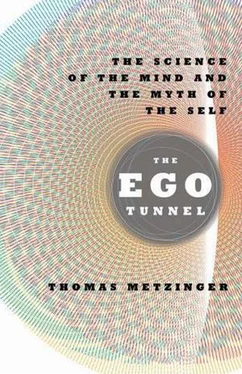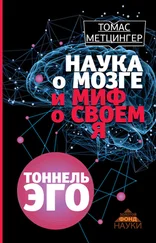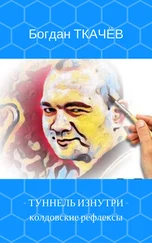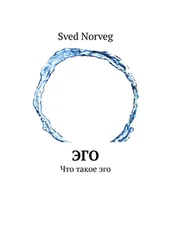Томас Метцингер - Туннель Эго
Здесь есть возможность читать онлайн «Томас Метцингер - Туннель Эго» весь текст электронной книги совершенно бесплатно (целиком полную версию без сокращений). В некоторых случаях можно слушать аудио, скачать через торрент в формате fb2 и присутствует краткое содержание. Жанр: Биология, на русском языке. Описание произведения, (предисловие) а так же отзывы посетителей доступны на портале библиотеки ЛибКат.
- Название:Туннель Эго
- Автор:
- Жанр:
- Год:неизвестен
- ISBN:нет данных
- Рейтинг книги:4 / 5. Голосов: 1
-
Избранное:Добавить в избранное
- Отзывы:
-
Ваша оценка:
- 80
- 1
- 2
- 3
- 4
- 5
Туннель Эго: краткое содержание, описание и аннотация
Предлагаем к чтению аннотацию, описание, краткое содержание или предисловие (зависит от того, что написал сам автор книги «Туннель Эго»). Если вы не нашли необходимую информацию о книге — напишите в комментариях, мы постараемся отыскать её.
Thomas Metzinger — The Ego Tunnel. The Science Of The Mind and The Myth Of The Self
Перевод с английского: Вячеслав Михайлов http://www.nwethik.com
Туннель Эго — читать онлайн бесплатно полную книгу (весь текст) целиком
Ниже представлен текст книги, разбитый по страницам. Система сохранения места последней прочитанной страницы, позволяет с удобством читать онлайн бесплатно книгу «Туннель Эго», без необходимости каждый раз заново искать на чём Вы остановились. Поставьте закладку, и сможете в любой момент перейти на страницу, на которой закончили чтение.
Интервал:
Закладка:
2. B.-P. Bejjani et al., «Transient Acute Depression Induced by HighFrequency Deep-Brain Stimulation,» N.E. Jour. Med. 340:1476-80 (1999). Here are examples of how the patient described her own conscious experience: «I'm falling down in my head, I no longer wish to live, to see anything, hear anything, feel anything.» The authors report that when she was asked why she was crying and if she felt pain, she responded: «No, I'm fed up with life, I've had enough. I don't want to live anymore, I'm disgusted with life. Everything is useless, always feeling worthless, I'm scared in this world.»
When asked why she was sad, she replied: «I'm tired. I want to hide in a corner. I'm crying over myself, of course. I'm hopeless, why am I bothering you.» Note that deep brain stimulation can also have just the opposite effect, namely, relief from serious, treatment-resistant depression. Here is a description: «All patients spontaneously reported acute effects including 'sudden calmness or lightness,' 'disappearance of the void,' 'sense of heightened awareness,' 'connectedness,' and sudden brightening of the room, including a sharpening of visual details and intensification of colors in response to stimulation.» See H. Mayberg, «Clinical Study: Deep Brain Stimulation for Treatment-Resistant Depression,» Neuron 45:651–660 (2005).
3. C. M. Cook & M. A. Persinger, «Experimental Induction of the 'Sensed Presence' in Normal Subjects and an Exceptional Subject,» Percept. Mot. Skills 85:683–693 (1997). For a critical assessment and self-experiential report, see John Horgan, Rational Mysticism: Dispatches from the Border Between Science and Spirituality (New York: Houghton Mifflin, 2003).
4. See M. A. Persinger, «Religious and Mystical Experiences as Artifacts of Temporal Lobe Function: A General Hypothesis,» Perc. Mot. Skills 57:1255-62 (1983). Clinicians have long observed a deepening of emotionality plus the development of a serious, highly ethical and spiritual demeanor in certain patients with chronic mesial temporal lobe epilepsy. Whether this can count as evidence for a specific kind of «personality syndrome» is still disputed. See O. Devinsky & S. Najjar, «Evidence Against the Existence of a Temporal Lobe Epilepsy Personality Syndrome,» Neurology 53:S13-S25 (1999); D. Blume, «Evidence Supporting the Temporal Lobe Epilepsy Personality Syndrome,» Neurology 53:S9-S12 (1999).
5. For more information, see the Web portal my collaborators Carsten Griesel and Elisabeth Hildt have created at www.neuroethics.uni-mainz.de.
6. B. Maher, «Poll Results: Look Who's Doping,» Nature 452:674–675 (2008). See also B. Sakhanian & S. Morein-Zamir, «Professor's Little Helper,» Nature 450:1157-5 (2007).
7. M. J. Farah et al., «Neurocognitive Enhancement: What Can We Do and What Should We Do?» Nature Reviews Neuroscience 5:421–425 (2004). Four years later, after a careful analysis of pros and cons and perhaps surprisingly to many, leading figures in neuroethics are now coming to the conclusion that «We should welcome new methods of improving our brain function. In a world in which human workspans and lifespans are increasing, cognitive enhancement tools-including the pharmacological-will be increasingly useful for improved quality of life and extended work productivity, as well as to stave off normal and pathological accerelated cognitive declines. Safe and effective cognitive enhancers will benefit both the individual and society.» See H. Greely et al., «Towards Responsible Use of Cognitive-Enhancing Drugs by the Healthy,» Nature 456:702–705 (2008).
8. For a first and careful discussion of this important question, see T. Douglas, «Moral Enhancement,» J. Appl. Phil. 25:228–245 (2008).
9. Alexander Shulgin and Ann Shulgin, PiHKAL: A Chemical Love Story (Transform Press, 1991); and Alexander Shulgin, TiHKAL: The Continuation (Transform Press, 1997).
10. W. N. Pahnke & W. A. Richards, «Implications of LSD and Experimental Mysticism,» Jour. Religion & Health 5:179 (1966).
11. R. R. Griffiths et al., «Psilocybin Can Occasion Mystical-Type Experiences Having Substantial and Sustained Personal Meaning and Spiritual Significance,» Psychopharm. 187:268–283 (2006).
12. R. R. Griffiths et al., «Mystical-Type Experiences Occasioned by Psilocybin Mediate the Attribution of Personal Meaning and Spiritual Significance 14 Months Later,» Jour. Psychopharm. 22:621–632 (2008).
13. N. Malleson, «Acute Adverse Reactions to LSD in Clinical and Experimental Use in the United Kingdom,» Br. Jour. Psychiatry 118:229–230 (1971).
14. S. Cohen, «Lysergic Acid Diethylamide: Side Effects and Complications,» Jour. Nerv. Ment. Dis. 130:30–40 (1960).
15. See R. J. Strassman, «Adverse Reactions to Psychedelic Drugs: A Review of the Literature,» Jour. Nerv. Men. Dis. 172:577–595 (1984); J. H. Halpern & H. G. Pope, «Do Hallucinogens Cause Residual Neuropsychological Toxicity?» Drug Alcohol Depend. 53:247–256 (1999); M. W. Johnson et al., «Human Hallucinogen Research: Guidelines for Safety,» Jour. Psychopharm. 22:603–620 (2008). In the most recent and comprehensive review of the scientific literature, the authors actually make the interesting (and perhaps bold) claim that «The incidence of psychotic reactions, suicide attempts, and suicides during treatment with LSD […] appears comparable to the rate of complications during conventional psychotherapy.» See Torsten Passie et al., «The Pharmacology of Lysergic Acid Diethylamide: A Review,» CNS Neuroscience & Therapeutics 14:295–314 (2008).
16. B. Vastag, «Poised to Challenge Need for Sleep, 'Wakefulness Enhancer' Rouses Concerns,» Jour. Amer. Medic. Assoc. 291(2):167 (2004).
17. See Judy Illes, Neuroethics: Defining the Issues in Theory, Practice, and Policy (New York: Oxford University Press, 2005); and P. R. Wolpe et al., «Emerging Neurotechnologies for Lie-Detection: Promises and Perils,» Amer. Jour. Bioethics 5(2):39–49 (2005); or T. Metzinger, «Exposing Lies,» Scientific American MIND, October/November:32–37 (2006).
18. Haim Harari, «Democracy May Be on Its Way Out» (2006), www.edge.org/q2006/q06_2.htmlfflharari.
Интервал:
Закладка:
Похожие книги на «Туннель Эго»
Представляем Вашему вниманию похожие книги на «Туннель Эго» списком для выбора. Мы отобрали схожую по названию и смыслу литературу в надежде предоставить читателям больше вариантов отыскать новые, интересные, ещё непрочитанные произведения.
Обсуждение, отзывы о книге «Туннель Эго» и просто собственные мнения читателей. Оставьте ваши комментарии, напишите, что Вы думаете о произведении, его смысле или главных героях. Укажите что конкретно понравилось, а что нет, и почему Вы так считаете.








